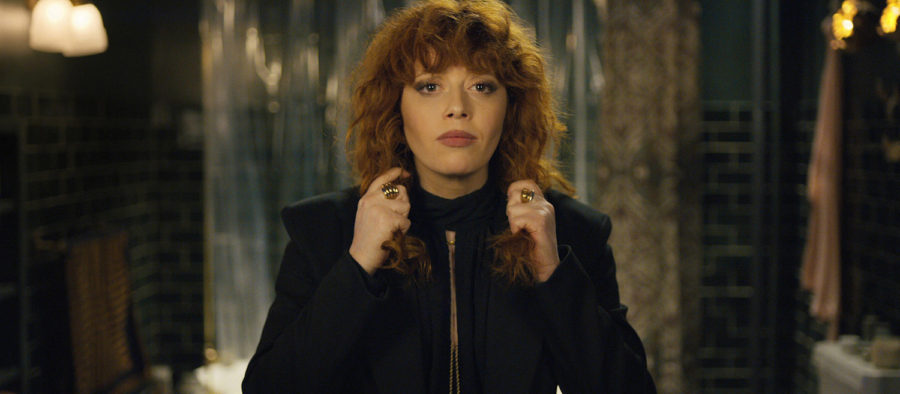Netflix’s latest show ‘Russian Doll’ asks — but doesn’t answer — major questions of mortality
“Russian Doll” production still.
February 18, 2019
Lots of people, whether they’re depressed or not, grapple with the idea of their own mortality in life. But in Netflix’s new series “Russian Doll,” it really doesn’t matter.
After celebrating her 36th birthday, Nadia Vulvokov (Natasha Lyonne) keeps dying, only to find herself immediately transported to the day before. The show follows her in her quest to figure out what the heck is happening and why.
The first season only has eight half-hour episodes, but so much is packed into each one that you will certainly have to pause multiple times to try to piece the story together yourself.
Nadia offers her own theories throughout the show — my favorite being that bad drugs caused crazy trip — but those only lead to another question. Who is Alan Zaveri (Charlie Barnett), the man that Nadia finds out also keeps dying?
The duo navigates their deaths and resurrections together, going through breakups, makeups and everything in between. Multiple substances come into play, including ketamine and large doses of alcohol, further complicating not only their deaths, but also their abilities to solve the mystery.
At first, it seemed that Nadia didn’t have real chemistry — sexual or otherwise — with any of the other characters in the show, including her ex-boyfriend, John Reyes (Yul Vasquez). But in the sixth episode — wow. Let me just say the mood that a certain scene with a certain man put me in is inappropriate to describe in this publication.
“Russian Doll” gives the perfect balance between feeling like you are in the main characters’ shoes while also not knowing anything about them. In a way, the death and rebirth motif almost feels like a metaphor for depression — each day living with it can feel like a whole different life.
Mental illness isn’t addressed in the show particularly until the very end, though one of Nadia’s close friends is a “shrink.” Rotting fruit also pops up multiple times throughout the series, bringing up an image of fleeting self-worth and value.
Nadia and Alan are perfect foils for each other, making their scenes wildly entertaining. Nadia, almost 40, still doesn’t bat an eye at smoking a joint laced with cocaine, while Alan is heartbroken that his longtime lover won’t accept his marriage proposal to lead into a picture-perfect life.
The deaths, while normally hilarious — like Nadia breaking her neck while falling down the same staircase three times — take a dark turn sometimes, making you wonder what the implications are for a possible future season.
The payoff for watching the show is not currently evident, making me wonder if the directors even anticipated more than one season. After watching shows like “Pretty Little Liars” and “Riverdale,” I’ve grown to expect a fantastic and seemingly thought-out plot buildup only to have the big reveal not make sense in the end.
In the seventh episode, a new theme is explored: sympathy for others. Frankly, this seems like a cop out. Being killed by the universe for being a bad person makes sense, but with that logic, everyone in the show should face the same death-loop fate.
Any show or movie that has to do with time travel, multiple deaths of a person or mixing several drugs always has room for glaring story line errors that can never be fixed without revising them, and it may be that “Russian Doll” is going to have the same fate.
Nadia is such a dynamic character in that her suffering is both comical and concerning. Her accent that you can’t quite pinpoint — who says “cock-a-roach?” — adds a mystique to the character that only adds to the mystery of the death story line.
In the last few episodes, a spooky poltergeist, murder-mystery thing starts to happen, confusing the plot even more. Toss in a few childhood flashbacks and it’s almost guaranteed “Russian Doll” will have another season, if only because there are so many loose ends that need tying up.
I’m not quite sure how invested I’ll be in another season of death and mystery, and while eight episodes provide about four hours of entertainment and confusion, “Russian Doll” should have had more production time before its release. The plot feels one-dimensional and shortsighted, and the ending of season one was totally unsatisfying.
Nadia’s drug-filled lifestyle could have had more to do with the outcome of her life, but instead it is only a side note within the complex story line. The connection of Nadia and Alan seems random enough to just fulfill the “opposites attract” story line, but there is never an explanation as to why the two are universally attracted to each other.
“I don’t know why I’m alive,” Nadia admits late in the first season, which only leads to the rebuttal, “Well, you’re not. Not really.”
“Russian Doll” is worth a watch if you like the “Groundhog Day”-esque concept of living through the same experience over and over again — or if you simply like the confusion of an ambiguous story line. As someone who likes having a show on in the background of doing work, I would not recommend “Russian Doll” for that endeavor.



